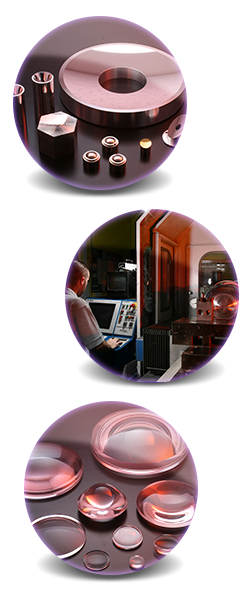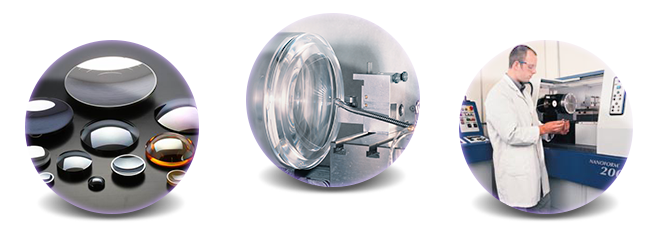 Materials Machined (partial list)
Materials Machined (partial list)
- Germanium
- Zinc Selenide, Zinc Sulfide & Cleartran®
- Silicon
- IR chalcogenide glass (GASIR®, AMTIR®, IG4, IG6)
- Acrylics, Zeonex® and polycarbonate
- CaF2 & BaF2
- Aluminum & copper
- Ni-plated steel and Nibron
Equipment & Capability
We employ the latest slow-tool servo technology on our 3-axis machines enabling us to produce non-rotationally symmetric surfaces including toroids, cylinders and free-forms. We can produce bi-aspheric lenses 4mm in size to hemispherical domes up to 350mm in diameter. All our machines incorporate the latest hydrostatic slide-ways and linear motor technology. They are also fitted with heavy-duty spindles.
Equipment (partial list)
- Precitech Nanoform 200 (Hi-Speed)
- Precitech Nanoform 350
- Moore Nanotech 250 with Slow-Tool Servo (x2)
- Precitech 250 Ultra with Slow-Tool Servo
- Schneider SLG-120 CNC Generator
- Schneider SLP-120 CNC Polisher
- LOH C-2SL & C-2 CNC Edging Systems
We have extensive metrology to ensure the demanding characterization of aspheric and hybrid surfaces. Surface profilometry is performed with our Talysurf PGI Series 2 and PGI 1240 instruments. Mild-departure aspheric surfaces can also be directly characterized using our Fisba phase-shifting interferometer. Our Talysurf CCI 3000A white light interferometer provides non-contact measurement of surface quality and diffractive features. The diamond-turning facility is supported by the in-house capabilities of Phoenix Optical Technologies to generate blanks, produce custom tooling and polish non-diamond-turned surfaces.  The combination of equipment stability and skilled machinists lead to vastly improved form control and surface finishes on all materials. Phoenix is ISO 9001:2000 certified since 1997. We hold the following typical form and roughness tolerances. This table is meant only as a rough guide as actual specifications are strongly dependent upon component geometry:
The combination of equipment stability and skilled machinists lead to vastly improved form control and surface finishes on all materials. Phoenix is ISO 9001:2000 certified since 1997. We hold the following typical form and roughness tolerances. This table is meant only as a rough guide as actual specifications are strongly dependent upon component geometry:
| We hold the following typical form and roughness tolerances. This table is meant only as a rough guide as actual specifications are strongly dependent upon component geometry: | ||
| Material | Roughness (ra) | Surface Form (um) |
|---|---|---|
| ZnS or Cleartran® | 4 nm | 0.25 to 0.6 |
| ZnSe | 5 nm | 0.25 to 0.6 |
| Germanium | 3 nm | 0.25 to 0.6 |
| Silicon | < 12 nm | 0.4 to 0.6 |
| Chalcogenide Glass | 5 nm | 0.25 to 0.6 |
| CaF2 & BaF2 | < 10 nm | < 0.4 |
| Acrylic | 5 nm | 0.3+ |
| Zeonex ® | 8 nm | 0.3+ |
| Polycarbonate | < 10 nm | 0.4+ |
| Aluminum | < 8 nm | 0.125 to 1.0 |
| Other Metals | 3 to 8 nm | 0.3 to 1.0 |
| Values based on measurements performed with our Talysurf CCI white light interferometer. | ||
For additional information please visit http://phoenixopticaltechnologies.co.uk/
